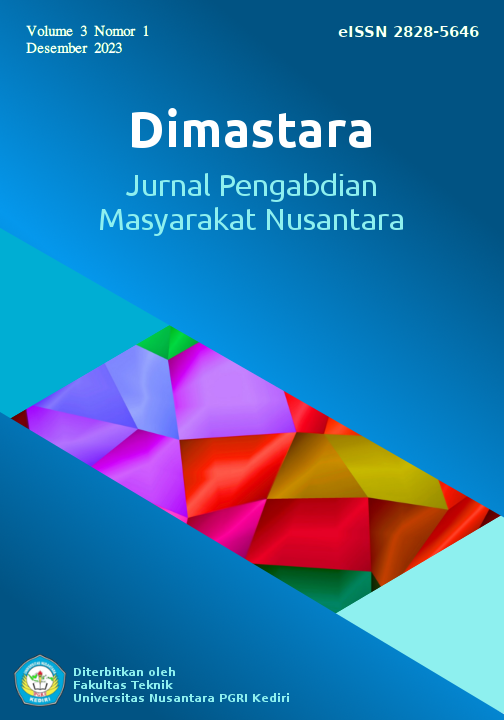Pelaksanaan Pemilihan Kepala Desa e-Voting di Kabupaten Magetan
DOI:
https://doi.org/10.29407/dimastara.v3i1.21522Keywords:
e-voting, magetan, pilkadesAbstract
The development of information technology has also created various innovations, including in the government sector, such as the implementation of village head elections using the e-voting system. In this activity, the author acts as a village head election committee with the main task of preparing the Temporary Voter List (DPS) and preparing the Permanent Voter List (DPT). For the author, this activity is a form of community service activity. The stages of implementing village head elections include: formation of a committee, coordination meetings, registration and determination of village head candidates, voting via an e-voting system, announcement of results, and ending with the disbandment of the committee. The method of implementing service uses qualitative methods. The implementation of village head elections using the e-voting system in Magetan Regency ran in an orderly and safe manner.
Downloads
References
[2] P. K. Magetan, “Peraturan Bupati (PERBUP) Kabupaten Magetan Nomor 44 Tahun 2021 tentang PERUBAHAN ATAS PERATURAN BUPATI MAGETAN NOMOR 34 TAHUN 2019 TENTANG PEDOMAN TATA CARA PEMILIHAN, PENGANGKATAN DAN PEMBERHENTIAN KEPALA DESA,” 2021. https://peraturan.bpk.go.id/Details/213274/perbup-kab-magetan-no-44-tahun-2021
[3] G. D. Langoday, “Politik Identitas Etnis Kedang Pada Pemilihan Kepala Daerah Kabupaten Lembata 2017,” J. Mengkaji Indones., vol. 2, no. 1, pp. 81–107, 2023.
[4] N. F. Fatmawati and D. Suparto, “Efektivitas E-Voting Pada Pilkades Di Kabupaten Pemalang Tahun 2018,” J. Ilm. Indones., vol. 5, no. 7, pp. 419–430, 2020.
[5] A. Azis, I. Setiawan, and A. Risqiantoro, “Aplikasi E-Voting Untuk Pemilihan Kepala Desa Berbasis Website,” J. Inf. Syst. Manag., vol. 1, no. 1, pp. 1–7, 2019.
[6] M. Halwan, M. Darwin, S. Setiadi, and N. I. Kurniawan, “Digitalisasi Demokrasi dalam Penerapan E-Voting Pada Pilkades di Kabupaten Bantaeng, Sulawesi Selatan,” J. Soc. Policy Issues, pp. 182–187, 2022.
[7] D. Indrawan and D. Mashur, “INOVASI PEMILIHAN KEPALA DESA BERBASIS E-VOTING DI DESA BATU GAJAH KECAMATAN PASIR PENYU KABUPATEN INDRAGIRI HULU,” J. Adm. Negara, vol. 1, no. 1, pp. 1–14, 2023.
[8] A. Nurdin, U. Hamim, and R. Mahmud, “Partisipasi Politik Masyarakat Dalam Pemilihan Kepala Desa Melalui E-Voting Tahun 2019 di Desa Lito Kecamatan Paguyaman Pantai Kabupaten Boalemo,” Innov. J. Soc. Sci. Res., vol. 3, no. 2, pp. 711–720, 2023.
[9] M. R. Fadli, “Memahami desain metode penelitian kualitatif,” Humanika, Kaji. Ilm. Mata Kuliah Umum, vol. 21, no. 1, pp. 33–54, 2021.
[10] D. Magetan, “Alur Tata Cara PILKADES dengan e-Voting,” 2023. https://www.instagram.com/p/CwjY8iIvxSV/
Downloads
Published
Issue
Section
License
Penulis yang menerbitkan jurnal ini menyetujui persyaratan berikut:
- Hak cipta atas artikel apa pun dipegang oleh penulisnya.
- Penulis memberikan jurnal, hak publikasi pertama dengan karya yang dilisensikan secara bersamaan di bawah Lisensi Atribusi Creative Commons yang memungkinkan orang lain untuk membagikan karya dengan pengakuan atas kepenulisan dan publikasi awal karya tersebut dalam jurnal ini.
- Penulis dapat membuat pengaturan kontrak tambahan yang terpisah untuk distribusi non-eksklusif dari versi jurnal yang diterbitkan dari karya tersebut (misalnya, mempostingnya ke repositori institusional atau menerbitkannya dalam sebuah buku), dengan pengakuan dari publikasi awalnya di jurnal ini.
- Penulis diizinkan dan didorong untuk memposting karya mereka secara online (misalnya, di repositori institusional atau di situs web mereka) sebelum dan selama proses pengiriman, karena hal itu dapat mengarah pada pertukaran yang produktif, serta kutipan yang lebih awal dan lebih besar dari karya yang diterbitkan.
- Artikel dan materi terkait yang diterbitkan didistribusikan di bawah Lisensi Internasional Creative Commons Attribution-ShareAlike 4.0













